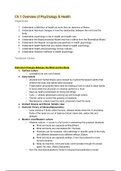Study guide
PSYC 314 Health Psychology Final Study Guide
- Module
- Institution
- Book
All you need to get at least a grade B for this course! Included slides, readings, quizlet links for each chapter. It will make your life easier!! I promise!!!
[Show more]




